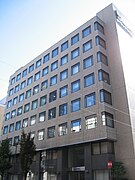| This article relies excessively on references to primary sources. Please improve this article by adding secondary or tertiary sources. Find sources: "Shimadzu" – news · newspapers · books · scholar · JSTOR (October 2020) (Learn how and when to remove this message) |
  | |
| Native name | 株式会社 島津製作所 |
|---|---|
| Company type | Public KK |
| Traded as | TYO: 7701 OSE: 7701 |
| Industry | Precision Instruments |
| Founded | Kyoto, Japan (1875 (1875)) |
| Founder | Genzo Shimadzu |
| Headquarters | 1, Nishinokyo-Kuwabara-cho, Nakagyo-ku, Kyoto 604-8511, Japan |
| Area served | Worldwide |
| Key people | Teruhisa Ueda, (President and Chief Executive Officer) |
| Products | Scientific, medical, aircraft and industrial instruments |
| Revenue | $ 3.5 billion (FY 2019) (¥ 385.4 billion) (FY 2019) |
| Net income | $ 384.19 million (FY 2019) (¥ 41.8 billion) (FY 2019) |
| Number of employees | 13,182 (as of March 31, 2020) |
| Website | Official website |
| Footnotes / references | |
Shimadzu Corporation (株式会社 島津製作所, Kabushiki-gaisha Shimadzu Seisakusho) is a Japanese public KK company, manufacturing precision instruments, measuring instruments and medical equipment, based in Kyoto, Japan. It was established in 1875. The American arm of the company, Shimadzu Scientific Instruments, was founded in 1975.
History
Founding and early years
The company was established by Genzo Shimadzu Sr. (島津 源蔵, Shimazu Genzō) in 1875. During the 1890s and 1900s, Shimadzu experienced rapid growth that occurred at the same time as higher education grew in Japan.
X-ray devices, the spectrum camera, the electron microscope, and the gas chromatograph were developed and commercialized in advance of other Japanese companies. Shimadzu became a corporation in 1917. The American arm of the company, Shimadzu Scientific Instruments, was founded in 1975.
Developments
The company also developed, in 2001, an ultra-high speed video camera, HyperVision HPV-1, which is capable of recording at 1,000,000 FPS, while in 2016 it released the HyperVision HPV-X2, a camera that achieves ultra-high-speed continuous recording at 10 million frames per second at Full Pixel Resolution. Other products developed by Shimadzu include head-mounted displays.
The company had revenue of ¥264.048 billion yen ($2.8 billion USD) in FY 2012, with 10,395 employees as of March 31, 2013.
Acquisition history
In 2019, Shimadzu's Medical subsidiary in USA acquired CORE Medical Imaging, Inc. to strengthen healthcare business in North America.
In 2018, Shimadzu acquired Infraserv Vakuumservice GmbH of Germany in order to strengthen their turbomolecular pump sales and service capabilities in Europe.
In 2017, Shimadzu acquired AlsaChim, a specialist for high-quality analytical isotope labeled standards.
In 1989, Shimadzu Corporation acquired Kratos Group Plc. in U.K. to expand in surface analysis and MALDI-TOF segments.
Gallery
Products
-
 Shimadzu's Nexera series HPLC (2019)
Shimadzu's Nexera series HPLC (2019)
-
 Inside the cover of a Shimadzu Ion Trap-Time of Flight mass spectrometer in 2008. Visible are power supplies, circuit boards, the flight tube, ion gauges etc.
Inside the cover of a Shimadzu Ion Trap-Time of Flight mass spectrometer in 2008. Visible are power supplies, circuit boards, the flight tube, ion gauges etc.
-
 2009 MALDI mass spectrometer (in the Applications Lab of Shimadzu Scientific Instruments, Columbia, MD)
2009 MALDI mass spectrometer (in the Applications Lab of Shimadzu Scientific Instruments, Columbia, MD)
-
 SHIMADZU GC-2010 Plus High-end Gas Chromatograph
SHIMADZU GC-2010 Plus High-end Gas Chromatograph
Buildings
-
 Shimadzu Foundation Memorial Hall in the Nakagyo-ku ward of Kyoto in 2006
Shimadzu Foundation Memorial Hall in the Nakagyo-ku ward of Kyoto in 2006
-
 Shimadzu office building in Tokyo
Shimadzu office building in Tokyo
See also
- List of companies of Japan
- List of scientific instruments manufacturers
- Medical devices
- Laboratory equipment
- Mass spectrometry
References
- Official website
- ^ "FY2019 Operating Results&Financial Position" (PDF).
- "Corporate Profile". 9 February 2018.
- ^ "Corporate Profile". Retrieved April 16, 2014.
- ^ "Annual Report 2013" (PDF). Archived from the original (PDF) on March 27, 2014. Retrieved April 16, 2014.
- ^ Goto, Kazuko (2012). "Craft and creativity: New economic spaces in Kyoto". New Economic Spaces in Asian Cities: From Industrial Restructuring to the Cultural Turn. Routledge. ISBN 9780415567732.
- ^ Swartz, Michael E. (2000-02-18). Analytical Techniques in Combinatorial Chemistry. CRC Press. pp. 278–279. ISBN 9780203909966.
- ^ The Decade of the Great War. Koninklijke Brill. 2014. pp. 362–363. ISBN 978-90-04-27427-3. Retrieved 7 August 2020.
- A page about HyperVision HPV-1 on official site Archived 2007-02-08 at the Wayback Machine
- Gareth Edwards (March 29, 2005). "Shimadzu's million-frame-per-second video camera". Engadget. Retrieved April 16, 2014.
- "A World's First - Journey to Unknown Realms of High Resolution and Ultra-High Speeds". Shimadzu. Archived from the original on April 19, 2014. Retrieved April 17, 2014.
- Jesus Diaz (March 21, 2014). "Watch a ball breaking glass filmed at 10 million frames per second". Sploid. Retrieved April 17, 2014.
- "Shimadzu Data Glass 3/A". Archived from the original on June 29, 2007.
- Official website
- Official website
- Official website
- Official website
External links
- Official global website (in English)
- Official Japanese website (in Japanese)
- Official Asia Pacific online webstore (in English)
- Electronics companies of Japan
- Defense companies of Japan
- Instrument-making corporations
- Laboratory equipment manufacturers
- Medical technology companies of Japan
- X-ray equipment manufacturers
- Research support companies
- Manufacturing companies based in Kyoto
- Manufacturing companies established in 1875
- Japanese companies established in 1875
- Japanese brands
- Companies listed on the Tokyo Stock Exchange
- Companies listed on the Osaka Exchange